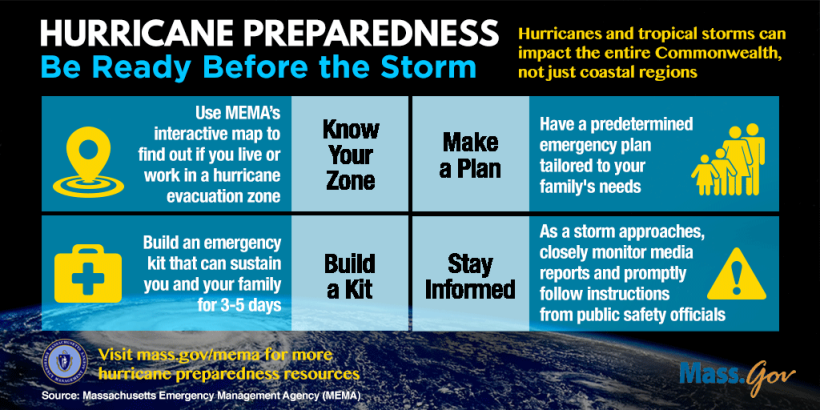Be Prepared for Hurricane Season
Summer is here and though the colder months were kind to us with less snow than previous years, the warmer weather is still a welcomed reprieve from the frigid temperatures in the northeast. Along with these rising temps, however, comes the start of hurricane season along the Atlantic. With many of our clients living along the eastern seaboard or escaping the city to vacation in summer homes and rentals, we like to periodically share hurricane safety tips from the Massachusetts Emergency Management Agency (MEMA) in hopes of increasing preparedness. Please take a moment to read the tips below to remain safe during hurricanes and tropical storms:
- Make an Emergency Plan: Develop a plan for how to communicate with and find your loved ones in a tropical storm or hurricane. Your plan should meeting locations, shelter-in-place plans, and considerations for family members with access and functional needs, and pets. If you are traveling, be aware of where local grocery and hardware store, and hospitals are located.
- Build an Emergency Kit: Gather items that would sustain your family or group for three days in case of isolation, road closures, or power outage. Bottled water, extra batteries, and a first aid kits are musts and depending on needs other staples may include medications and medical devices, glasses and contacts, diapers and formula, etc.
- Stay Informed and Know Your Evacuation Zone: Paying attention to advance warning and emergency alerts is critical to remaining safe during natural emergencies. Aside from local media, methods of receiving emergency alerts include the Emergency Alert System, NOAA Weather Radio, 2-1-1 Hotline, and Social Media outlets. Evacuation zones and procedures vary from state-to-state. Be aware of local guidelines and Massachusetts visitors and residents can visit mass.gov/knowyourzone for more information.
- Know Your Insurance Coverage: Take the time to understand your home insurance coverage, and which types of damage due to natural disasters are protected or excluded. A discussion with your agent can also unveil paths to decrease your coverage. For example, in some areas simply getting a flood certificate can decrease your policy premium by thousands.

